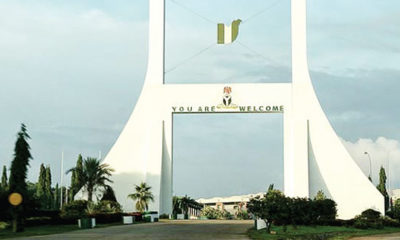Politics
SERAP Threatens Wike, 36 Gov With Legal Action Over FAAC

The Socio-Economic Rights and Accountability Project (SERAP) has given Nigeria’s 36 state governors and the Minister of the Federal Capital Territory, Abuja, Nyesom Wike the options of availing them of documents on the spending of FAAC allocations received since 1999, widely publishing such documents or facing legal action.
The SERAP also urged them “to invite Independent Corrupt Practices and Other Related Offences Commission (ICPC) and Economic and Financial Crimes Commission (EFCC) to jointly track and monitor the spending of FAAC allocations by your state and the FCT and to probe any allegations of corruption linked the allocations.”
Biztellers reports that the SERAP’s requests followed reports that the Federation Account Allocation Committee (FAAC) disbursed N1.123 trillion to the federal, state, and local governments for March 2024 alone. States collected N398.689 billion.
The demands were contained in the Freedom of Information (FoI) requests dated 20 April 2024 and signed by SERAP deputy director Kolawole Oluwadare.
The organisation stated, “Nigerians ought to know in what manner public funds including FAAC allocations, are spent.
“Without this information, Nigerians cannot follow the actions of their states and the FCT and they cannot properly fulfill their responsibilities as citizens.”
According to the SERAP, “trillions of FAAC allocations received by Nigeria’s 36 states and the FCT have allegedly gone down the drain. The resulting human costs directly threaten the human rights of socially and economically vulnerable Nigerians.”
The FoI requests, read in part, “ensuring that the FAAC allocations received by your state and the FCT are spent to achieve the security and welfare of Nigerians are serious and legitimate public interests.
“Secrecy in the spending of FAAC allocations received by your state and the FCT is entirely inconsistent and incompatible with the Nigerian Constitution 1999 [as amended] and the country’s international anti-corruption obligations.
“Secrecy in the spending of FAAC allocations received by your state and the FCT also denies Nigerians the right to know how public funds are spent. Transparency in the spending would allow them to retain control over their government.
“The documents should include the evidence and list of specific projects completed with the FAAC allocations collected, the locations of any such projects and completion reports of the projects.
“The documents should also include details of the salaries and pensions paid from the FAAC allocations collected, as well as the details of projects executed on hospitals and schools with the FAAC allocations.
“Despite the increased FAAC allocations to states and FCT, millions of residents in your state and the FCT continue to face extreme poverty and lack access to basic public goods and services.
“The reported removal of petrol subsidy and the floating of the exchange rate by the Federal Government has translated into increased FAAC allocations to states and the FCT. However, there is no corresponding improvement in the security and welfare of millions of Nigerians.
“FAAC allocations received by your state and the FCT are reportedly characterised by mismanagement, diversion of funds, and abandoned projects. FAAC allocations have also been allegedly spent for other purposes such as election campaigns and political patronage.
“Publishing the documents on the spending of FAAC allocations by your state and the FCT would promote transparency, accountability, and reduce the risks of corruption in the spending of the funds.
“Publishing the documents would enable Nigerians to meaningfully engage in the implementation of projects executed with the FAAC allocations collected.
“The report that some 140 million Nigerians are poor suggests corruption and mismanagement in the spending of trillions of naira in FAAC allocations collected by your state and the FCT.
“We would be grateful if the recommended measures are taken within 7 days of the receipt and/or publication of this letter. If we have not heard from you by then, SERAP shall consider appropriate legal actions to compel you and your state and the FCT to comply with our requests in the public interest.
“According to our information, the Federation Account Allocation Committee (FAAC) last week disbursed N1.123 trillion to the federal, state and local governments for March 2024.
“State governments got N398.689 billion while local government councils got N288.688 billion. The mineral-producing states received an additional N90.124 billion (13% of mineral revenue). In February, states collected N336 billion.
“According to the Nigeria Extractive Industries Transparency Initiative (NEITI), the federal, states and local governments shared N10.143 trillion from the Federation Account as statutory revenue allocations in 2023, with states collecting N3.585 trillion.
“SERAP also urges you to provide details of the transparency and accountability mechanisms that have been put in place to ensure that the trillions of naira of FAAC allocations that have been received by your state and the FCT are not embezzled, misappropriated or diverted into private pockets.
“SERAP is concerned about the persistent lack of transparency and accountability in the spending of FAAC allocations by your state and the FCT.
“SERAP notes that Section 15(5) of the Nigerian Constitution requires public institutions to abolish all corrupt practices and abuse of power.
“Section 16(2) of the Nigerian Constitution further provides that, ‘the material resources of the nation are harnessed and distributed as best as possible to serve the common good.’
“Section 13 of the Nigerian Constitution imposes clear responsibility on your state to conform to, observe and apply the provisions of Chapter 2 of the constitution.
“Nigeria has made legally binding commitments under the UN Convention against Corruption to ensure accountability in the management of public resources.
“Nigerians are entitled to the right to receive information without any interference or distortion, and the enjoyment of this right should be based on the principle of maximum disclosure, and a presumption that all information is accessible subject only to a narrow system of exceptions.
“The Freedom of Information Act, Section 39 of the Nigerian Constitution, article 9 of the African Charter on Human and Peoples’ Rights and article 19 of the International Covenant on Civil and Political Rights guarantee to everyone the right to information, including the documents on the spending of FAAC allocations by your state.
“The Nigerian Constitution, Freedom of Information Act, and the country’s anti-corruption and human rights obligations rest on the principle that citizens should have access to information regarding their public institutions’ activities.”
Politics
Edo Women Protest Against Natasha Over Akpabio
Party loyalty and personal leanings on the political gbas-gbos rocking the Nigerian Senate have echoed in Edo State with women groups moving publicly against Senator Natasha Akpoti-Uduaghan.
These turn of events, which appeared to have the blessing of the Edo State Government was detailed in a government house statement in Benin City, under the signature of the Chief Press Secretary to the Governor, Fred Itua.
According to the statement, the All Progressives Congress (APC) Senatorial Woman Leader for Edo South, Hon. Barr. Itohan Osahon, led protest demanding that Sen Akpoti-Uduaghan should apologise to Senate President Godswill Akpabio.
ALSO READ: Reps Approve Tinubu’s Tax Reform Bills, Senate To Follow
Itua made clear on which side the Edo State was standing, when the Secretary to the State Government, Barr. Musa Ikhilor, received the pro-Akpabio demonstrators, on behalf of the governor, Senator Monday Okpebholo.
He cited the President, Senior Citizens of Edo State, Rosemary Elawure, as having made it clear that the women embarked on the peaceful protest in support of Senate President Godswill Akpabio.
The statement reads, “A group of concerned women from Edo State has called on Senator representing Kogi Central, Natasha Akpoti-Uduaghan to humble herself and apologize to Senate President Godswill Akpabio and Nigerians for dragging the name of the nation in the mud.
The women gave the charge during a peaceful protest to the Edo State Government House.
Led by the All Progressives Congress (APC) Senatorial Woman Leader for Edo South, Hon. Barr. Itohan Osahon, the women were received by the Secretary to the State Government, Barr. Musa Ikhilor on behalf of the governor, Senator Monday Okpebholo who was out of the State on an official assignment.
Speaking, Osahon said: “We are concerned women of Edo State and we are not comfortable with what is going on at the red chamber. Natasha is not the only woman in the Senate and the Senate is not about sexual harassment.
“She was suspended because she violated the rules of the Senate and she is manipulating the whole issue against the Senate President, Sen. Godswill Akpabio. Senator Natasha has been suspended for six months for disobeying the Senate Rules, not for sexual harassment.
“We don’t want her to abuse the opportunity given to her to serve her people. Our First Lady was once a senator and was there for years and such issue was not experienced. We have had many women in the Senate and House of Representatives and we have not had issues like this.
“Traveling all around the world, disgracing the country, making us the laughing stock and making a whole lot of noise about the issue. She should just apologize to the Senate. Edo State women are women who respect tradition and respect our men. She should not drag us to the mud.
“Our demand is that Natasha should be called to order and sentiments should not come to play and she should respect the rules of the Senate.”
The President, Senior Citizens of Edo State, Mrs. Rosemary Elawure said the women embarked on the peaceful protest in support of Senate President Godswill Akpabio.
She said Sen. Natasha lied against Senator Akpabio and that she was not the only senator whose seat was changed in the red chambers.
“Senior citizens don’t support things that will not bring progress and development to the country. Edo women are in support of the Senate President who has a very beautiful and intelligent wife who is humble and respectful. We urge Senator Natasha to be respectful and obey the rules of the Senate,” she counselled.
The women asked her to apologize to the Senate, House of Representatives as well as State Houses of Assembly in the country.
Receiving the women, Barr. Ikhilor commended them for a peaceful protest and expressing themselves freely, noting that women are very big stakeholders in Edo State.
He noted that the National Assembly is for all Nigerians and thanked the women for adding their voices to the issues concerning Sen. Natasha and the President of the Senate.
“You are here to make a very strong point regarding what is going on as it is now disturbing. It is wrong for facts to be distorted and manipulated. Nigerians are beginning to become conscious.
“Nigerians are aware of what happened in the Senate. The issue is all about the rules and regulations and anyone who disobeys them should face the consequences. Women are fighting for bigger issues facing them and Sen. Natasha can’t serve as the stumbling block stopping women from progressing.
“Sen. Akpabio has made a distinguished career in public service and we have confidence in him and his ability to manage the red chamber. The Senate is not a place for content creation and distractions but for serious minded people. Information should not be manipulated or distorted as Nigerians know what is happening in the Senate and can’t be deceived again.
“The governor is a senator and knows what happened in the chamber. He has confidence in the Senate President Godswill Akpabio. He will carry this message to different levels as we all have to protect our institutions.”
Politics
Reps Approve Tinubu’s Tax Reform Bills, Senate To Follow

The House of Representatives has adopted the report on the four tax reform bills of the President Bola Ahmend Tinubu administration.
The house made the adoption on Thursday at plenary in Abuja.
Having scaled the lower house, the tax reform bills now await the endorsement of the Senate.
ALSO READ: Economic Reforms Aim To Protect Nigeria’s Future – Tinubu
Notably, the adopted bills include the Nigerian Tax Bill, the Tax Administration Bill, the Revenue Tax Board Bill, and the Nigerian Revenue Service Establishment Bill.
The chairman of the House of Representatives Committee on Finance, Hon James Abiodun Faleke, said, “These bills underwent three full days of public hearings, with input from over 80 key stakeholders. Afterwards, we held an eight-day retreat to debate each clause.”
He assured Nigerians that the tax reform bills would produce widely acceptable laws.
“I am glad that House members recognised our thorough work and approved all our recommendations,” Faleke said.
He thanked fellow lawmakers and the House leadership for entrusting his committee with processing the tax bills and presenting them for consideration.
He commended President Tinubu for prioritising tax law reforms, noting that some existing tax laws date back to 1959.
“We cannot continue using outdated tax laws that no longer meet our business, survival, and revenue needs,” he stressed.
On his part, the Deputy Committee Chairman, Hon Saidu Abdullahi (APC-Niger), noted that no bill in the 10th Assembly had generated as much debate as the tax reform bills.
He praised Speaker Tajudeen Abbas for fostering consensus among stakeholders, ensuring broad-based input into the legislative process.
Hon Abdullahi highlighted that representatives from all geopolitical zones and regional thought leaders were involved, easing public concerns.
“The committee’s recommendations reflect the contributions of various stakeholders.
“These were never seen as perfect documents. The Executive made proposals, and the public hearing allowed Nigerians to refine them. Lawmakers have now endorsed the final version,” he added.
In the same vein, Hon Ikeagwuonu Ugochinyere (PDP-Imo) described the process as transparent, with consultants and the Executive making adjustments to reflect public interest.
“In spite of being in the opposition, we are proud of this historic moment. It will expand the tax net and increase government revenue.
“This reform will enhance tax collection efficiency while protecting small businesses. That is why we worked together to ensure its passage,” Hon Ugochinyere said.
In the views of Hon Benson Babajimi (APC-Lagos), all stakeholder concerns, including inheritance tax, derivation, and VAT, were carefully considered.
“This is a great day for Nigeria. The House has approved the necessary reforms, and we now await Senate concurrence,” he said.
Politics
Edo Govt Accuses PDP Of Backing Kidnappers

The ragging battle for the soul of Edo State between the All Progressives Congress (APC) and the Peoples Democratic Party (PDP) has taken a dramatic turn, with the APC-run government accusing the PDP leadership of being the brain behind the menace of kidnapping ravaging the state.
The Chief Press Secretary to the Governor, Fred Itua, in a statement in Benin City on Tuesday averred that intelligence reports indicate the involvement of PDP leaders in recent kidnappings and violent crimes across the state.
He posited that the opposition PDP was sponsoring insecurity in Edo State as part of calculated efforts to undermine the administration of Governor Monday Okpebholo.
ALSO READ: Under Tinubu, Nigeria Is Moving In Right Direction
Itua described the PDP’s outcry over insecurity as “crocodile tears,” accusing them of deliberately orchestrating chaos while pretending to be concerned about public safety.
According to Itua, “The sudden concern expressed by PDP leaders is nothing but a smokescreen to divert attention from their own complicity. These are the same individuals who, during the 2024 governorship election, armed non-state actors with dangerous weapons, many of which were never recovered. Today, those weapons are in the hands of criminals terrorizing innocent Edo citizens.”
He added that the PDP’s strategy was to create an atmosphere of fear, spread misinformation, and discredit the current administration.
“Their goal is clear — destabilize the state, weaken public confidence in Governor Okpebholo’s leadership, and push a false narrative of failure. But Edo people can see through these antics,” Itua stated.
He revealed that the state government has called on security agencies, including the Nigeria Police, to launch a thorough investigation into the alleged involvement of PDP leaders in the rising wave of kidnappings and armed violence.
“No individual or political group should be allowed to hold the state hostage for political gain. Those found culpable must face the full wrath of the law,” he added.
Gov Okpebholo’s administration reaffirmed its commitment to tackling insecurity and ensuring the protection of lives and property. The government urged Edo residents to remain vigilant and not fall for what it described as the PDP’s “deceptive tactics.”
Itua pointed out that “Insecurity thrives when its perpetrators believe they are untouchable. It is time for security agencies to prove them wrong.”


















